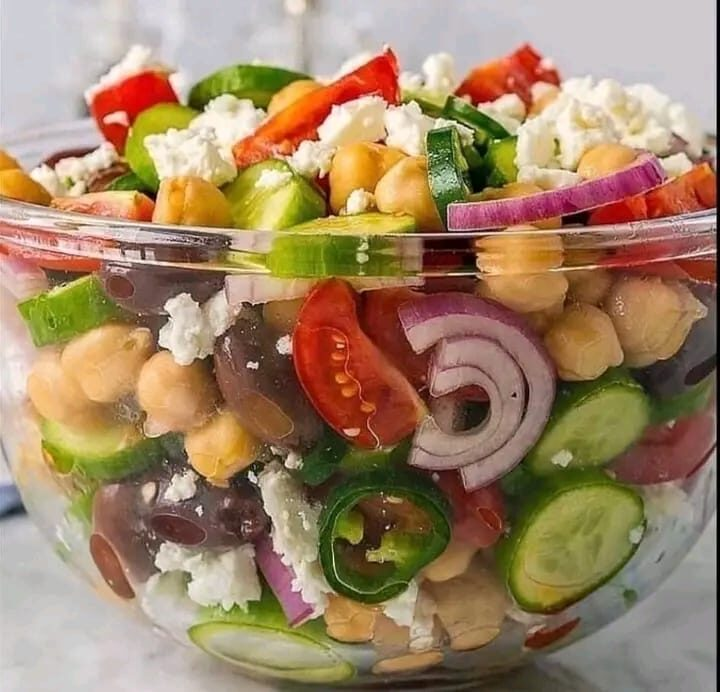Ingredients:
* 15 oz chickpeas, rinsed and drained
* 1/2 small red onion, sliced thin
* 2 cups cherry tomatoes, halved
* 1/3 cup pitted Kalamata olives
* 2 small English cucumbers, sliced
* 1/3 cup feta cheese, crumbled ( added a chopped jalapeno today for a little kick – totally optional!)
Dressing:
* 2 Tbsps extra virgin olive oil
* 2 Tbsp balsamic vinegar, OR apple cider vinegar for the extra health benefits
* 1 Tbsp raw honey
* 2 small garlic cloves, minced
* 1 tsp dried oregano
* Freshly ground sea salt and pepper, to taste
Instructions:
* .Place all chopped salad ingredients nicely into a large bowl
* In a small glass bowl, whisk together dressing ingredients.
* Add dressing to the salad bowl and toss gently to combine.
* This salad is great for meal prep as it stores perfectly in fridge for up to 3 days.
* Make sure you only mix it with the dressing right before serving if using for future meals.
Gut Health:
Plant-based diets are often associated with improved gut health due to the high fiber content from fruits, vegetables, and whole grains. A healthy gut microbiome is linked to better digestion and overall well-being.
Anti-Inflammatory Properties:
Many plant-based foods have anti-inflammatory properties, which can help in reducing inflammation in the body. Chronic inflammation is associated with various health issues, and a vegan diet may contribute to its prevention.
Sports Performance:
Contrary to the misconception that vegan diets lack protein, many successful athletes follow plant-based diets to enhance their performance. Plant-based proteins can support muscle building and recovery.
Reduced Risk of Foodborne Illnesses:
Plant-based diets eliminate the risk of foodborne illnesses associated with the consumption of undercooked or contaminated animal products.
Economic Impact:
A vegan diet can be more economical as plant-based protein sources tend to be cost-effective compared to some animal products. It may be a budget-friendly option for individuals or families.
Mindful Eating:
Adopting a vegan lifestyle often promotes mindful eating. Being more conscious of food choices and sources can lead to a healthier relationship with food and a greater appreciation for the environmental impact of dietary decisions.
Preservation of Biodiversity:
The expansion of animal agriculture often leads to habitat destruction and loss of biodiversity. Choosing a vegan diet supports the preservation of ecosystems and the protection of various species.
Culinary Diversity:
Veganism introduces individuals to a diverse range of cuisines and ingredients from around the world. Exploring plant-based cooking can be a culinary adventure, embracing flavors and techniques from different cultures.
Reduced Antibiotic Resistance:
The use of antibiotics in animal farming contributes to the rise of antibiotic-resistant bacteria. Opting for a vegan diet can be a way to reduce the demand for such practices and promote responsible antibiotic use.
Cruelty-Free Beauty and Personal Care:
Veganism extends to beauty and personal care products. Choosing cruelty-free, vegan alternatives ensures that your lifestyle aligns with ethical choices beyond just dietary preferences.
